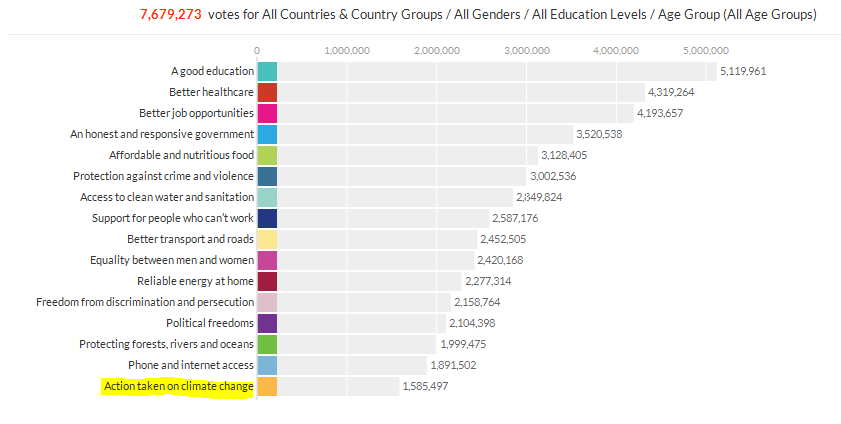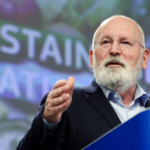Ondanks verwoede pogingen van meer extreme pro–AGWers (AGW = ‘Anthropogenic Global Warming’) om het opwarmingsvuurtje op te rakelen, is volgens opiniepeilingen klimaatverandering gezakt naar de laatste plaats van 16 thema’s waar de mensen zich zorgen om maken.
In het licht van de onophoudelijke stroom van paniekverhalen vanuit de overheid, politiek, wetenschap en media, die ons waarschuwen voor de verschrikkelijke opwarming van de aarde (die maar steeds niet wil komen), mag dat een wonder heten. Het is een geruststellend gedachte dat er grenzen zijn aan de macht van misleidende propaganda en dat de ‘wisdom of the crowds’ geen loze kreet is.
Maar de organisatoren van deze jaarlijkse hoogmis van de klimaatkerk – dit keer zelfs met pauselijke zegen – hebben geen vertrouwen in een goede afloop, vandaar dat de ateliers waar schaamlappen worden vervaardigd om dat te verhullen, thans reeds op volle toeren draaien.
Onder de titel, ‘Let’s Cut These Regressive Wind And Solar Taxes’, schreef Matt Ridley onlangs in ‘The Times’:
If the Paris climate conference produces its expected fudge, it will give the British government the opportunity to revisit its own CO2 targets. …
The 21st conference of the Parties to the United Nations Framework Convention on Climate Change, also known as the “11th session of the meeting of the parties to the Kyoto protocol”, in Paris this December, …. is to get international agreement to emissions cuts that will limit the global temperature increase to 2C above pre-industrial levels. Given that nobody knows for sure what those levels were, how sensitive to industrial emissions global temperatures are, how emissions will change, when the 2C threshold would be reached, how much natural climate change there will be, or how much damage (or benefit) two degrees of global warming would cause, this is as practical as arguing about the nature of the trinity. …
A binding climate treaty has [little] chance of passing the Republican-controlled Congress in the United States. … As Bloomberg reports, they are “coalescing around a deal that would commit every country to restricting greenhouse gases but bind none to specific targets”. Brilliant: a binding agreement to non-binding targets! Gesture, in other words, is all. …
Amber Rudd, the energy secretary, … is boldly trying to rein in some of Ed Miliband’s and Chris Huhne’s [haar voorgangers] regressive stealth taxes on energy bills, which have been subsidising crony capitalists in the renewable energy industry and driving jobs abroad. …
Ms Rudd also signalled that she would stop Britain’s policy of unilateral decarbonisation at a faster rate than other countries, as mandated in Mr Miliband’s Climate Change Act of 2008. Rightly she realises that it simply exports the problem, along with jobs in energy-intensive industries. Messrs Miliband and Huhne used to justify our unilateralism on the grounds that we were setting an example that the world would follow. We are the “world leader” in offshore wind, which produces electricity at three times the wholesale price and intermittently, only because the world seems unpersuaded to follow.
Dat is vaak de tragiek van gidslanden. Als de gids te veel vooruitloopt en achterom kijkt, blijkt dat hij zijn volgers is kwijt geraakt.
Supposing the Paris conference produces its expected fudge, what should our energy policy look like? The European Union is trying to get agreement on a 40 per cent reduction in emissions (from 1990 levels) by 2030, but this is conditional on agreement in Paris. The Poles and other Eastern European countries are opposed to going it alone again, even before a non-binding agreement in Paris. That will give the British government the opportunity to revisit its own targets.
According to part 1, section 2, of the Climate Change Act, the secretary of state has the power to amend the act’s CO2 targets if there is a significant change in international climate policy. She should grasp it. The targets were predicated on rising fossil fuel prices to make renewables look affordable (whereas fossil fuel prices have plummeted), on rapidly rising temperatures (temperatures have risen much more slowly over the past 40 years than predicted), and on international agreement (which has not been reached). Put money into research instead.
The political risk would be small. Parties sceptical of renewable energy have done well at the ballot box in Poland, Canada and Australia. The big green pressure groups have little backing among the public, just a lot of influence in parliament, the City and the BBC.
Aldus Matt Riddley.
Lees verder hier.
Het lijkt erop dat de Britten hun traditionele ‘common sense’ weer herontdekken. Hoog tijd voor Nederland om het Britse voorbeeld te volgen.
Voor mijn eerdere bijdragen over klimaat en aanverwante zaken zie hier, hier, hier, hier en hier.







Ik vraag me af hoe ze de 2 graden willen meten. Er moet dan wel een netwerk gemaakt worden van bijv. een aantal goed gekozen stations, waar het ten strengste verboden zal zijn om wat voor aanpassingen dan ook uit te voeren.
Het wordt warmer voor de klimaatwetenschappers:
http:// http://www.demorgen.be/wetenschap/-huurmoordenaar-doodde-klimaatwetenschappers-a2405921/
Beste Erik,
Jouw gedachte en veronderstelling dat het met de 2 graden stelling menens is, ook voor de alarmisten, is hilarisch.
Het is slechts een wederom ongefundeerde alarmistische claim welke tijd rekt en ruimte creëert om tot een ongedefinieerd moment in de toekomst regelgeving op te leggen en de maatschappij en economie te knevelen naar inzicht en welbehagen van een onvoorstelbaar machtige beweging waarvan de invloedssfeer nog steeds schromelijk wordt onderschat.
De grootste fout welke de sceptici hebben kunnen maken is het zich laten verleiden tot een gevecht op het wazige en gemanipuleerde gebied en mijnenveld van de alarmisten, zoals voorspellingen, statistieken, valse claims, computermodellen etc etc etc.
Hiermee is deze levensgevaarlijke beweging, ondanks de in principe meer dan belachelijke claims, helaas serieus genomen en feitelijk voor het gewone publiek (lees niet wetenschappelijk onderlegd) en politici gelegaliseerd.
Het publiceren en blijven herhalen van de historische CO2 concentraties, afgezet tegen de gemeten temperaturen, is voldoende om de AGW claims volledig onderuit te halen en verdere discussies overbodig te maken.
Wetenschappers zijn helaas niet goed in strategie en PR en kunnen deze strijd op de huidige ingeslagen weg welhaast niet winnen. Om maar niet te spreken over gebrek aan funding…
Klimaathysterici hebben wel een grote mond over de 2 graden claim en het relevante toekomstige klimaatbeleid. Waar ze altijd oorverdovend stil over zijn, is de evaluatie en monitoring van het vigerend klimaatbeleid. Want in NL is er inmiddels al een flinke HSL- en Betuwelijn aan uitgegeven.
In verband daar mee wil ik de weerzinwekkendheid van “klimaatbeleid” nog eens onder de aandacht brengen: In 2013 is er n.l. een parlementair onderzoek geweest naar kosten en effecten van klimaat- en energiebeleid. (Rapport 33 193, vergaderjaar 2012-2013). Zijn we dat al weer vergeten ? De driver voor dit rapport was niet alleen de argwaan t.o.v. de effectiviteit van klimaatbeleid, maar ook of dat uberhaupt meetbaar is.
Een van de conclusies was:
“Op basis van deze beschikbare evaluaties is het dan ook lastig gebleken om vast te stellen wat de beleidsbijdrage is geweest aan de reductie van broeikasgassen en de maatschappelijke kosten hiervan” . Capito ?
In Jip en Janneke taal: Sorry belastingbetaler, wij weten het ook niet meer, we slaan je vanaf 2005 wel ieder jaar 1,5 miljard uit je achterzak, maar we kunnen je niet vertellen op het nuttig is geweest.
Hiermee wordt ” beleid” naar een ander niveau getild: Beleidsinstrument en beleidsdoel hoef je niet meer te koppelen. De efficiency is ondergeschikt. Kortom, je doet maar wat.
Beste Michiel,
hele goede opmerking. Rapport moet meer en beter gelezen worden:
http://www.rvo.nl/sites/default/files/Eindrapport%20Tweede%20Kamer%20Onderzoek%20Kosten%20en%20effecten%20klimaat-%20en%20energiebeleid.pdf
conclusies zijn nu nog te erg voor woorden.